- Home
- Bette Lee Crosby
Memory House: Memory House Collection (Memory House Series Book 1) Page 2
Memory House: Memory House Collection (Memory House Series Book 1) Read online
Page 2
They sit and talk as the evening sky turns black and thunder sounds in the distance. When the grandfather clock chimes twelve, Ophelia sets the teakettle on to boil. It has become her custom each night to savor a cup of the special tea before retiring. Filling the diffuser with crushed leaves, she brews a mug of dandelion tea for herself. For Annie, who will soon enough come to know the power of the special tea, she creates a steaming mix of lavender and rosemary.
As the girl wraps her fingers around the warm mug and sips the fragrant mix she sighs. “I’m so lucky to have found the Memory House. It’s almost a miracle.”
“Indeed it is.” Ophelia touches her bony fingers to the girl’s shoulder and smiles. “Indeed it is.”
By the time the mugs are empty, Annie has begun to yawn.
“Oh my gosh,” she says, “I can hardly keep my eyes open.”
“It’s late,” Ophelia says. “Go to bed; get some sleep.”
Annie yawns again. “I’ll stay and help you clean up,” she offers, but as she stands her eyelids begin to droop.
“Nonsense,” Ophelia says. “There’s nothing but two mugs to rinse. Now shoo on out of here and get to bed.”
Growing sleepier by the second Annie answers, “Okay.”
Once back in the cozy room, she slides beneath the comforter and is lost to sleep in mere seconds.
After Ophelia snaps the kitchen light off, she walks to the back hall and listens for sounds of sleep from the girl’s room. In the still of night she can hear most anything—grass growing, a cloud moving and, yes, even the sound of her new guest dreaming. Once she hears the soft whisper of sleep she turns and starts toward the staircase.
She takes the stairs one at a time, slowly moving up and onto each step, first with her right leg, then bringing up the left. It is an arduous task because of the arthritis in her left knee, but Ophelia is not ready to abandon the loft. It is where she stores her finest treasures. It is closer to heaven, and it’s where memories are the sweetest.
It matters not that the oak boards of the floor are rough in spots and the whitewash of the walls has now faded into nothingness. The loft is a place where she can close her eyes and memories come without bidding. On a warm summer night when the windows are open and sounds float on a breeze, she can touch her hand to the Bible or the snow globe and hear the voices of children playing in the yard. How sweet they are. How young and unsuspecting.
On this night when Ophelia closes her eyes, the memories are sparse and she wonders if the time has come for her to leave the house. Although such a thought crosses her mind, she knows she will never do it. There is nowhere on earth like this house. It is tucked into the back corner of a lot that overlooks the pond where ducks and geese come summer after summer. The neighbors claim the birds settle in this pond because it is sheltered and the water remains warm until late November.
But Ophelia knows the real reason they return. They come back because this is a place meant for remembering.
Ophelia Browne
I came to this house seventy years ago when Edward and I were newly married. He’d just passed his twenty-third birthday and I was not yet twenty. Oh, how in love we were. I thought surely no woman ever loved a man as much as I loved Edward. Just looking at him made my insides feel warm.
With Edward by my side, ordinary things became special—the sunrise came in a burst of optimism and color, the rain against the window took on the sound of a song, even lingering in bed a few moments longer on wintery mornings was reason to celebrate.
Before we happened upon this place we were happy living in our rented apartment, but once we’d seen the house everything changed. There is a certain magic here; we both felt it the minute we stepped across the threshold. “This is where you belong,” Edward whispered in my ear, and I nodded happily.
We scraped together enough for a down payment, and within the month we moved in. We didn’t have money for furniture but we didn’t care. On warm summer nights we’d take a blanket out to the yard and lie side by side in the grass. We’d stay there for hours, looking up at the stars and talking about all the things we were going to do.
Ah, what wonderful dreams we had. He promised that one day we would see Paris, visit the pyramids and toss coins into the Fountain of Trevi. There were times when I would rest my head in his lap and close my eyes as he spoke of how we’d stroll through the shops then stop at a patisserie for a warm croissant and cup of hot chocolate. Listening to Edward tell of it, I felt like we were already there.
Lord God, those were happy days. That kind of happiness is something that needs to be remembered. If you start forgetting, it dies and you’re left with just the misery of what is instead of the joy of what was.
I wallowed in such misery for almost two years; then Edward told me to start remembering the good times and close out the tragedy that came after them. It’s not your fault, he said, and smiled with those blue eyes of his sparkling like stars. I heard his voice clear as a bell, but the moment I reached out for him he vanished into thin air. For weeks I wondered if it was the sadness making me crazy. But when I got to thinking that, I’d go back to the loft. Up there things made more sense and good memories came easier.
Some people are afraid of dying but not me. I know when I get to heaven I’ll find my dear sweet Edward again. He’ll pull me in into his arms and start telling me of all the places we can float off to.
How can you be afraid of something as wonderful as that?
The Garden
Saturday morning Annie wakes with a smile on her face. For several minutes she remains in bed savoring the sweetness of a dream that has now left her. She remembers only a feeling of happiness but cannot remember the dream itself. It was not of Michael, that she knows. Thoughts of him have almost vanished, and the emptiness of the hole he left behind has somehow been filled. There is a strange new excitement pulsing through her veins, an excitement she hasn’t felt in a very long time.
She tosses the coverlet back, climbs from the bed and pulls on her jeans. This sudden interest in growing things is an odd turn of events, but she is not in the mood to question it. She is ready for change, ready for something new, ready to leave her worn and weary thoughts behind.
Breezing into the kitchen, she sees Ophelia already at the stove. “Good morning,” she says brightly.
Ophelia returns the smile and motions Annie to sit. “I know you enjoyed these yesterday.” She sets a basket of biscuits and a jar on honey on the table. The yeasty aroma is as enticing as it was last night.
This time Annie does not hesitate. She helps herself to a biscuit and spreads it with honey that is thick with pieces of honeycomb.
“This isn’t from the store, is it?” she asks. Her words sound garbled coming through a mouthful of warm sweetness, but Ophelia understands.
“No, it isn’t,” she answers. “I keep a hive at the far end of the garden.”
Annie chuckles. “Is there anything you can’t do?”
“Oh, there are many things I can’t do,” Ophelia replies. “But I try not to think of them. Such thoughts only weigh a person down.”
Annie is still pondering the truth of that when Ophelia sets a platter of pancakes and bacon on the table, then pours two cups of dandelion tea.
Annie is a coffee-drinker and finds it almost impossible to start the day without a full mug. But on this particular morning she sips the dandelion tea and says nothing. Although it is pale in color and thin compared to the robust coffee she drinks, it is strangely satisfying. The bitterness that first stung her tongue is gone; in its place is a sweet aftertaste that reminds her of cherry wine.
Once the breakfast dishes are dried and put away, Ophelia leads Annie through a mudroom where she stops to put on a large straw hat. She hands a second one to Annie. It looks newer, not yet bleached by the sun. Together they go out the side door and into a garden larger than Annie imagined it might be.
The house is set back from the street so far that newcomers expect no backya
rd, which is almost true. The edge of the pond is a scant ten or fifteen feet from the back door. There is only a narrow strip of grass in the back, but on the far side of the house is a field wider perhaps than the house itself. Angled back behind the large willow, the garden is impossible to see from the street.
Annie gasps. “You planted this yourself?”
Ophelia nods with a proud smile. She then confesses that Tom, a farmer from the next town, turned the soil.
“That’s the hard part,” she says, “but he’s willing to do it in exchange for a basket of potpourri.”
They walk toward the rows of plants, and Ophelia stops at the tool shed to pull out a small ladder-back chair with sawed off legs. She hands it to Annie.
“Can you carry this?” she asks. Then she turns back to pick up the basket of gardening tools she hooks over her own arm.
When they reach the spot where a patch of yellow blossoms is taller than Ophelia’s knee, she takes the chair from Annie and sits in it. As she snips the heads of flowering yarrow they talk.
“What brought you to Memory House?” Ophelia asks.
Annie hesitates a moment, shrugs, then gives a lighthearted laugh. “Fate, I guess. I’m awfully glad to be here, but I think my finding this place was just pure luck.”
Ophelia smiles as Annie continues, telling of how she simply wanted to get away from the bad memories Michael left behind. Although the girl doesn’t realize it, she has answered Ophelia’s question.
Ophelia tends the garden every day, but it is not the rows of plantains and rosemary that keep her at the house; it is the memories. She fears her treasures will lose their power if taken away from here. This is where it began, and Ophelia believes this is where it must stay.
~ ~ ~
After spending the morning in the garden they return to the house. Ophelia leaves her dirty shoes in the mudroom and slides her feet into the slippers she keeps beneath the counter. Annie removes her sneakers and follows along barefoot. They go into the apothecary shop where Ophelia will hang some of the herbs and flowers she has gathered to dry. It will take days, maybe weeks, but in time they will be ready.
The apothecary shop is a small room with two silk chairs and a cluster of small tables. On each of the tables there is a display of Ophelia’s wares. One table has a basket with a perfusion of different-colored rose petals. Another has a potpourri with the smell of gingerbread cookies. A long table serves as a counter, and the wall behind it is lined with shelves. They contain bottles, jars and tins labeled with words Annie has never seen before.
“What’s Mugwort?” she asks.
Ophelia laughs. “It’s just an herb,” she answers and continues arranging the last of the day’s cuttings on a drying rack.
Annie traces her finger, along the other tins: damiana, Queen Elizabeth, orris, archangel.
“Don’t tell me you actually have an archangel bottled up in this jar,” she quips.
“Archangel is a root,” Ophelia answers. “When ground into powder and sewn into a sachet, it’s believed to protect children.”
Annie turns with a look of skepticism stretched across her face. “Really?”
Ophelia nods as she slides the last drying tray into place. “I grew up in the mountains of West Virginia where most believed in the healing power of herbs and roots. Perhaps it’s just an old wives’ tale, perhaps not.” She turns, leans closer to Annie and in a voice almost a whisper says, “But I can say for sure, when a new mama stitches an archangel sachet into her baby’s pillow, that woman’s heart rests easier.”
With her work in the apothecary now finished, Ophelia suggests they freshen up and have lunch on the side porch.
Although it takes Annie just a short while to wash up and change into the gabardine slacks she wore yesterday, when she gets to the porch a tray of sandwiches is already sitting on the table. Skirted with a cloth that puddles on the floor, the table is set with Limoges porcelain dishes.
Moments later Ophelia appears with a tray of iced tea and cookies.
“Here, let me help you with that.” Annie takes the tray and sets it on the table. “You shouldn’t have gone to all this trouble.”
Ophelia claims it is no trouble, and this is true. These are the things she enjoys doing. An elegant lunch on the side porch reminds her of Edward. It is as it was back then, when he sat across from her. She reaches for the small bouquet of roses on the teacart, and when her hand touches the vase she can hear Edward’s voice. It is a sound she has lived with all these years. A sound that is both sweet and sorrowful.
Ophelia has finished her sandwich and is nibbling on an almond cookie when the clang of a cowbell sounds. “A customer,” she explains and pushes back from the table.
“May I tag along?” Annie asks. The apothecary intrigues her.
With the girl trailing her, Ophelia enters the shop and gives a warmhearted greeting to the middle-aged man she calls Sam. Although he is pot-bellied and balding, he has a smile that is almost infectious.
“What are you in need of today?” Ophelia asks.
Sam hesitates a moment, looks over at Annie then motions toward the far corner of the room. When he walks over there, Ophelia follows.
“I ain’t comfortable talking in front of strangers,” he whispers.
Instead of explaining Annie, Ophelia simply gives a knowing nod and listens. The truth is the shop is so small even the tiniest whisper can be heard, no matter where a person stands.
“I’ve got Eloise Green coming for dinner tonight,” Sam says, “and I’m planning to ask if she’ll marry me. You got something that will…?”
Ophelia leans in acting every bit as secretive as Sam. “I certainly do,” she whispers. Promising the preparation will be ready in a minute, she takes a small dish from the shelf and mixes a thimbleful of damiana with a like amount of crushed lavender buds, then adds a pinch of thyme. She pours the mixture into a small bottle and hands it to Sam.
“A word of advice,” she tells him. “This works better when it is sprinkled over a round of roast beef.”
Sam smiles. “That’s sure enough what I’m gonna do.” He hands Ophelia a folded-up dollar bill and leaves the shop whistling.
When he is beyond earshot Annie asks, “Is that true?”
Ophelia laughs. “True enough. Roast beef is Eloise’s favorite food, and the mixture I gave Sam will make the meat even more flavorful.”
“But what if she doesn’t love him? Or doesn’t want to get married?”
With a sly little grin curling the corners of her mouth, Ophelia answers, “Eloise was in here two weeks ago and got a bottle of rosewater cologne. She asked if rosewater could encourage a man like Sam to propose.”
“But…” Annie stuttered, “if you knew they wanted to marry one another…”
“I knew, but they didn’t know. Things like rosewater and damiana won’t make a person fall in love, but thinking it will can give them the courage they need to make it happen.”
Ophelia bends and pulls a small wooden box from the bottom shelf. “Besides, it’s for a good cause. The money I make in the store goes to the Sisters of Mercy.”
Lifting the lid of the box, she drops the dollar on top of several more.
The Twelfth Child
On Sunday evening the moon is bright in the sky by the time they finish dinner. Ophelia suggests they take their tea on the side porch.
Annie carries the mugs to the porch, and Ophelia comes behind her with a plate of small pumpkin cakes. Each tiny cake is perfectly round and topped with sweet frosting.
At first they sit quietly, looking out on the moonlit garden. In the distance is the scarecrow Annie saw yesterday. He is wearing a plaid shirt, and the yellow of the plaid seems to be lit from within. Although he stands at the far end of the garden he somehow seems closer.
“Did you make that scarecrow yourself?” Annie asks. She already knows the answer will be yes.
Ophelia nods. “That was Edward’s favorite shirt.” The sound of nostal
gia is woven through her words. “Sometimes late at night I look out into the garden, and if I squint real hard I can almost imagine he’s my Edward.”
“Edward was your husband?”
Again Ophelia nods. She thinks about telling of the tragedy but decides against it. It is something she has not spoken of for all these many years, and perhaps it is best to leave it at rest. She speaks only of the good times.
“Edward and I came to this house not long after we were married,” she says. “We were out for a Sunday drive when we just happened upon it and fell in love with the place. The funny thing is,” she adds with a laugh, “we weren’t even looking for a house. We were looking for a place to picnic.”
“I take it Edward is…” The word “dead” is at the tip of Annie’s tongue when she changes it to “gone”.
“Yes,” Ophelia answers. “Almost sixty years ago.”
For the first time in the two days Annie has been there, she sees sadness in the woman’s face. It is the look of loneliness swimming to the surface. Of course she is lonely, Annie reasons, living here with nothing but a scarecrow and garden for company. Spurred on by the growing fondness she feels for Ophelia, Annie asks why she has remained in the house for so long.
“Being here all alone,” she says. “Wouldn’t you be happier in one of those lovely places that offer assistance? You’d have friends your own age and nice hot meals—”
Ophelia interrupts. “I’m happy here. And I’m not all alone. I’ve got my guests, I’ve got neighbors who come to the apothecary and I’ve got Edward.”
A look of confusion wrinkles Annie’s brow. “I thought Edward was gone.”
“Only his body,” Ophelia replies. “His spirit is still here. All the memories we made in those ten short years, they’re still here.”
Annie stretches her hand across the table and places it atop Ophelia’s gnarled fingers. The gentleness of understanding softens her voice.

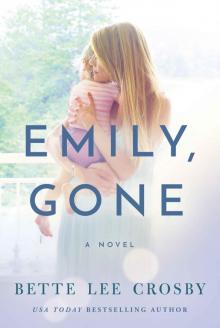 Emily, Gone
Emily, Gone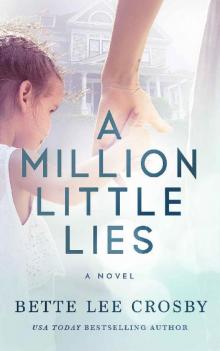 A Million Little Lies
A Million Little Lies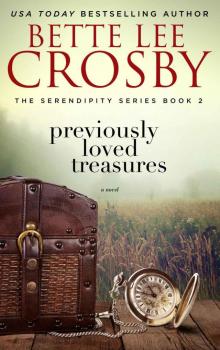 Previously Loved Treasures
Previously Loved Treasures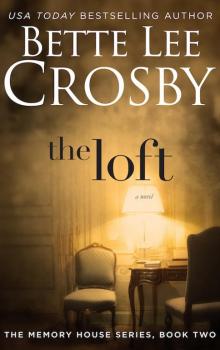 The Loft
The Loft Spare Change
Spare Change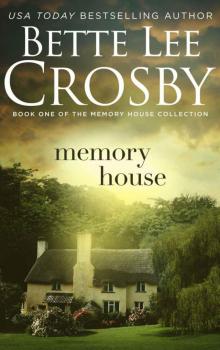 Memory House: Memory House Collection (Memory House Series Book 1)
Memory House: Memory House Collection (Memory House Series Book 1)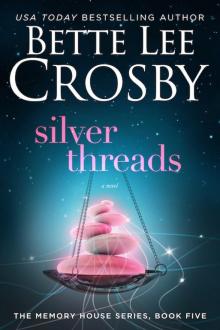 Silver Threads
Silver Threads Wishing for Wonderful: The Serendipity Series, Book 3
Wishing for Wonderful: The Serendipity Series, Book 3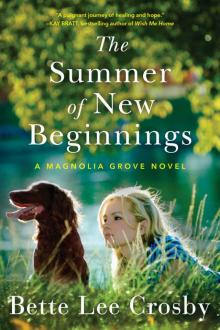 The Summer of New Beginnings: A Magnolia Grove Novel
The Summer of New Beginnings: A Magnolia Grove Novel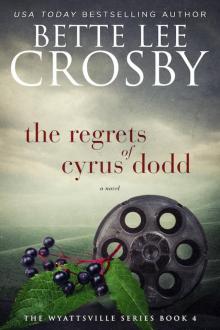 The Regrets of Cyrus Dodd
The Regrets of Cyrus Dodd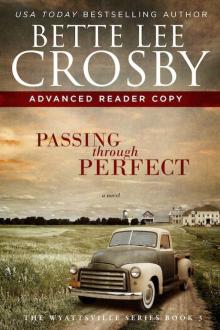 Passing Through Perfect
Passing Through Perfect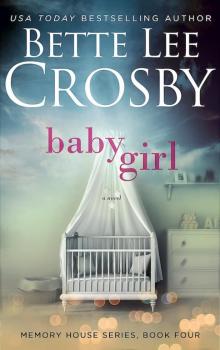 Baby Girl
Baby Girl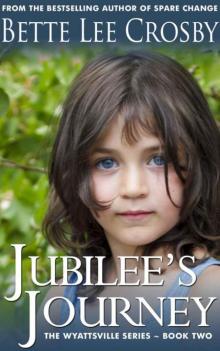 Jubilee's Journey
Jubilee's Journey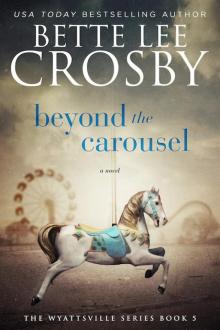 Beyond the Carousel
Beyond the Carousel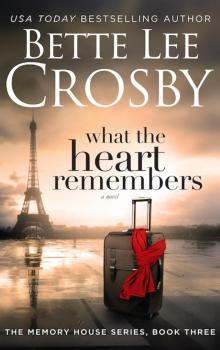 What the Heart Remembers
What the Heart Remembers Cupid's Christmas
Cupid's Christmas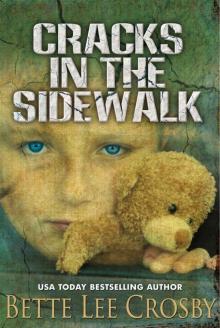 Cracks in the Sidewalk
Cracks in the Sidewalk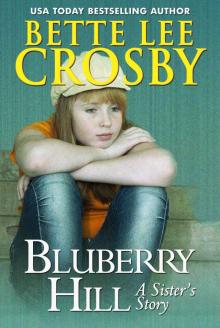 Blueberry Hill
Blueberry Hill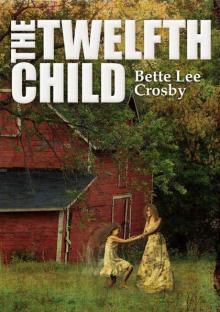 The Twelfth Child
The Twelfth Child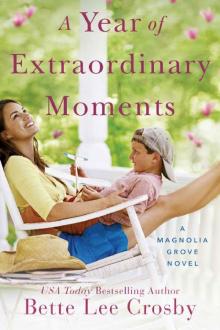 A Year of Extraordinary Moments (A Magnolia Grove Novel)
A Year of Extraordinary Moments (A Magnolia Grove Novel)